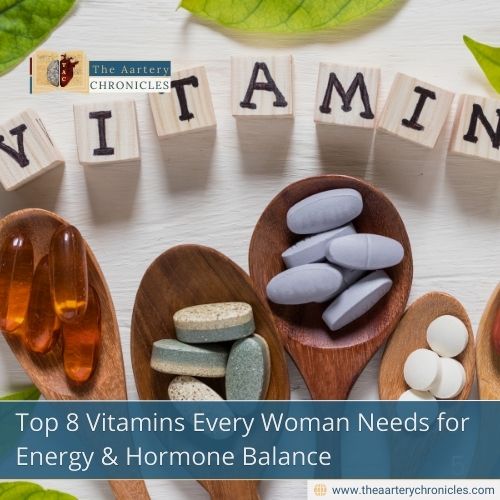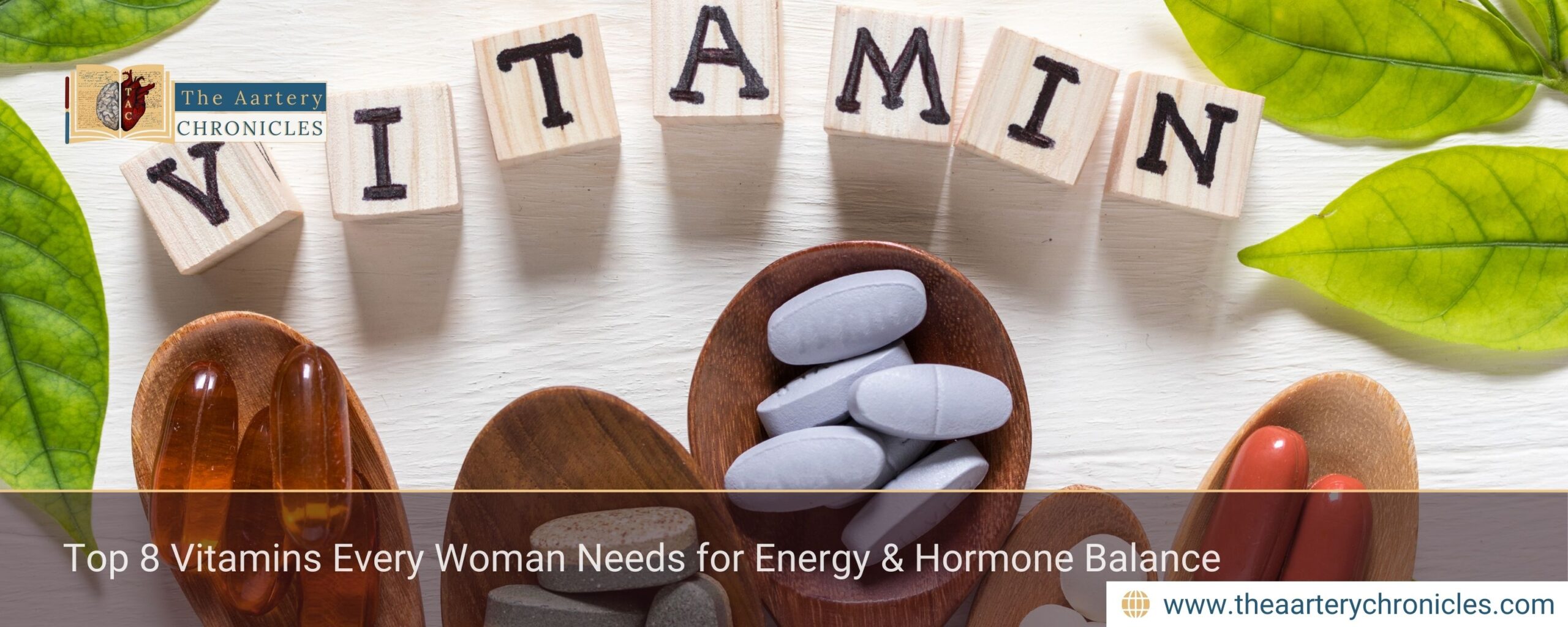

Top 8 Vitamins Every Woman Needs for Energy & Hormone Balance
Introduction
Good nutrition is the cornerstone of a healthy life, but even a balanced diet may not always provide all the nutrients your body needs, especially for women, whose needs change with age, hormones, and lifestyle factors. From bone strength to reproductive health and hormonal balance, the right vitamins and supplements can help women thrive through every life stage.
Here are eight essential vitamins and supplements every woman should consider, and why they matter.
1. Calcium
Why it’s important
Calcium is essential for building and maintaining strong bones and teeth, which becomes especially important for women nearing menopause, when the risk of osteoporosis and fractures increases. It also supports muscle function and overall skeletal health.
Beyond its bone-protective benefits, calcium plays a role in hormonal regulation and ovulation, contributing to reproductive health.
Recommended intake and Best Sources
- 1,000–1,200 mg per day through a combination of food and supplements.
Dairy products, leafy green vegetables, fortified plant-based milks, almonds, and tofu.
2. Vitamin D
Why it’s important
Vitamin D helps your body absorb calcium and supports immune function, mood balance, and bone health. For women specifically, vitamin D also supports ovarian function and helps regulate menstrual cycles. Low levels of vitamin D have been associated with irregular menstrual cycles, polycystic ovary syndrome (PCOS), and decreased fertility.
Recommended intake and Best Sources
- 600-800 IU per day, though individual needs may be higher depending on age, sun exposure and health status.
Sunlight, fatty fish (like salmon and mackerel), egg yolks, and fortified foods. Vitamin D3 supplements are often recommended, especially for those with limited sun exposure.
3. Iron
Why it’s important
Iron is vital for producing hemoglobin, the protein in red blood cells that carries oxygen throughout the body. Pregnant women typically require increased iron to support the expanded blood volume needed for fetal growth and development.
Low iron levels can lead to hormonal imbalances and irregular menstrual cycles, which may adversely affect fertility. Maintaining adequate iron levels is especially important for women who are trying to conceive, as it supports overall reproductive health.
Recommended intake and Best Sources
- 18 mg per day for menstruating women; higher amounts during pregnancy; 8 mg for postmenopausal women.
Red meat, lentils, spinach, fortified cereals, and beans. Iron supplements should only be taken after consulting a healthcare provider and confirming deficiency through blood tests.
4. Folic Acid (Folate)
Why it’s important
Folate is essential for DNA synthesis, cell growth, and red blood cell formation. It’s especially important during the reproductive years and pregnancy, as it helps prevent neural tube defects in developing babies.
Recommended intake and Best Sources
- 400–600 mcg per day, depending on age and pregnancy status.
Leafy greens, citrus fruits, legumes, and fortified grains. A prenatal vitamin with folic acid is recommended when planning a pregnancy.
5. Magnesium
Why it’s important
Magnesium supports muscle and nerve function, energy production, and heart health. It also plays a role in regulating blood sugar and blood pressure — both important for long-term metabolic health.
Magnesium can also help ease premenstrual syndrome (PMS) symptoms like mood swings and cramps. Furthermore, it supports the ovulation process and may help manage some of the hormonal and metabolic symptoms of PCOS, particularly those related to insulin resistance
Recommended intake and Best Sources
- 310–420 mg per day.
- Nuts, seeds, whole grains, dark leafy greens, legumes, and dark chocolate. Since many women don’t meet their magnesium needs through food alone, supplements may be beneficial.
6. Omega-3 Fatty Acids
Why it’s important
Omega-3s are healthy fats known for their anti-inflammatory properties and heart-protective benefits. For women, they may help ease menstrual discomfort and reduce symptoms of PMS.
During pregnancy, omega-3s are essential for fetal brain and eye development, making them a critical nutrient for both maternal and fetal health.
Recommended intake and Best Sources
- While there are no official daily intake recommendations for all types of omega-3s, experts have set guidelines for ALA (alpha-linolenic acid). For women, the recommended daily intake of ALA ranges from 1.1 to 1.4 grams, depending on age and life stage.
- Fatty fish (such as salmon and sardines), flaxseeds, chia seeds, walnuts, and algae-based supplements for plant-based diets.
7. Vitamin B12
Why it’s important
Vitamin B12 supports red blood cell production, nerve function, and energy metabolism. As women age, their ability to absorb B12 decreases, making supplementation more important — especially for those over 50 or following vegetarian or vegan diets.
Recommended intake and Best Sources
- 2.4 mcg per day.
Animal products like meat, eggs, dairy, and fortified plant-based milks. Vegans and older adults may need a supplement or B12 injections.
8. Probiotics
Why it’s important
Probiotics are beneficial bacteria that help maintain a healthy gut microbiome, which is linked to digestion, immune function, mood, and even skin health. For women, a balanced gut flora can also support vaginal health and may reduce the risk of yeast infections and UTIs.
Recommended strains and Best Sources
- Look for Lactobacillus and Bifidobacterium strains.
Yogurt, kefir, sauerkraut, kimchi, and high-quality probiotic supplements.
Conclusion
The nutrients listed above are foundational to a woman’s overall health, supporting everything from strong bones and hormone balance to fertility and disease prevention. While a healthy diet is the best place to start, supplements can help fill in the gaps, especially during key life stages like adolescence, pregnancy, menopause, and beyond.
Before starting any new supplement, it’s important to consult with a healthcare provider to determine your specific needs and ensure you’re not exceeding safe limits.
- Dr Anjali Singh
- Medicine and Diseases
- 23 September 2025
- 11:00
Reviewed by Dr Aarti Nehra (MBBS, MMST)








